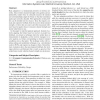Free Online Productivity Tools
i2Speak
i2Symbol
i2OCR
iTex2Img
iWeb2Print
iWeb2Shot
i2Type
iPdf2Split
iPdf2Merge
i2Bopomofo
i2Arabic
i2Style
i2Image
i2PDF
iLatex2Rtf
Sci2ools
122
click to vote
HOTNETS
2010
2010
Automatic rate adaptation
Rate adaptation is a fundamental primitive in wireless networks. Since wireless channel strength varies quickly and unpredictably, senders have to constantly measure the channel and correspondingly adapt the bitrate so that the transmitted packet gets correctly decoded. Prior approaches to this problem can be divided into two classes: those that require constant and expensive feedback from the receiver about channel strength, or those that use coarse and often inaccurate inference based on packet losses to measure channel strength and decide what bitrate to use. In this paper we take the opposite approach. Instead of actively adapting the bitrate based on receiver or packet loss feedback, we present a technique where the sender does no measurement or adaptation, yet the receiver manages to receive packets at a bitrate corresponding to whatever channel conditions exist at that point. The technique works with existing coding and modulation techniques (e.g. convolutional codes in WiFi), ...
Related Content
| Added | 17 May 2011 |
| Updated | 17 May 2011 |
| Type | Journal |
| Year | 2010 |
| Where | HOTNETS |
| Authors | Aditya Gudipati, Sachin Katti |
Comments (0)

